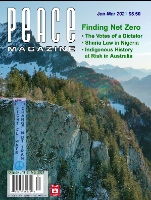
Peace Magazine Jan-Mar 2021, page 26. Some rights reserved.
Search for other articles by James Dorsey here
Increasing strains between Pakistan and its traditional Arab allies, Saudi Arabia, and the United Arab Emirates, is about more than Gulf states opportunistically targeting India’s far more lucrative market.
At the heart of the tensions that potentially complicate Pakistan’s economic recovery is also India’s ability to enhance Gulf states’ capacity to hedge their bets amid uncertainty about US commitments.
India is a key member of the Quad that also includes the United States, Australia, and Japan. Designed as the backbone of an Indo-Pacific strategy to counter China across a swath of maritime Asia, it could play a role in a future, more multilateral, regional security architecture in the Gulf.
The Gulf states are unlikely to pick sides but remain keen on maintaining close ties with both sides of the widening divide. The mounting strains with Pakistan are also the latest iteration of a global battle for Muslim religious soft power that pits Saudi Arabia and the UAE against Turkey, Iran, and Indonesia’s Nahdlatul Ulama, the world’s largest Islamic movement.
Muslim-majority states in Asia are trying to walk a middle line. Pakistan, home to the world’s largest Shiite Muslim minority, has reached out to Turkey while seeking to balance relations with Iran. Pakistani Prime Minister Imran Khan recently alleged that the US and another unidentified country were pressing him to establish diplomatic relations with Israel. Pakistani and Israeli media named Saudi Arabia as the unidentified country. As the world’s second most populous Muslim nation, Pakistan’s recognition, following the UAE and Bahrain, would be significant.
Pakistan twice in the last year signalled a widening rift with the kingdom. Mr. Khan had planned to attend an Islamic summit hosted by Malaysia and attended by Turkey, Iran and Qatar, but not the kingdom and a majority of Muslim states. The Pakistani prime minister cancelled participation under Saudi pressure.
Pakistan again challenged Saudi leadership of the Muslim world when Foreign Minister Shah Mahmood Qureshi complained that the Saudi-dominated Organization of Islamic Cooperation (OIC)—which groups the world’s 57 Muslim-majority nation—was not supporting Pakistan in its conflict with India over Kashmir. Qureshi said that his country would seek support beyond the kingdom.
Turkish President Recep Tayyip Erdogan, visiting Pakistan earlier this year, pointedly reiterated Turkey’s support for Pakistan in the Kashmir dispute. By openly challenging the kingdom, Mr. Qureshi was hitting Saudi Arabia as it seeks to repair an image tarnished by allegations of human rights abuse.
Pakistan has failed to ensure that it would be removed from the grey list of the Financial Action Task Force, an international anti-money laundering and terrorism finance watchdog, despite progress in the country’s legal infrastructure and enforcement. Grey listing causes reputational damage and makes foreign investors and international banks more cautious in dealing with countries without a clean bill of health.
Responding to Mr. Qureshi’s challenge, Saudi Arabia demanded that Pakistan repay a US$1 billion loan that helped ease the South Asian nation’s financial crisis. The kingdom has also dragged its feet on renewing a US$3.2 billion oil credit facility that expired in May.
In what Pakistan will interpret as UAE support for Saudi Arabia, the Emirates recently included Pakistan on its version of US President Donald Trump’s Muslim travel ban. Inclusion on the list of 13 Muslim countries no longer receiving visas for travel to the UAE increases pressure on Pakistan, which relies on exporting labor to generate remittances and alleviate unemployment. Improvement in Saudi-Turkish relations could see Pakistan fall through geopolitical cracks.
In the first meeting between senior Saudi and Turkish officials since the killing of journalist Jamal, the two countries’ foreign ministers, Prince Faisal bin Farhan and Mevlut Cavusoglu, held bilateral talks at a conference in Niger. “A strong Turkey-Saudi partnership benefits the whole region,” Mr. Cavus<\h>oglu tweeted. Added Imtiaz Ali, another analyst: “Riyadh will continue exploiting Islamabad’s economic vulnerabilities … But in the longer term, Riyadh cannot ignore the rise of India in the region, and the two countries may become close allies—which will increase the strain on Pakistan-Saudi relations.”
Dr. James M. Dorsey is a senior fellow at S. Rajaratnam School of International Studies in Singapore.

Peace Magazine Jan-Mar 2021, page 26. Some rights reserved.
Search for other articles by James Dorsey here